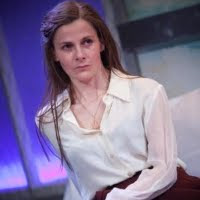After a successful first season of "Revolt," Christopher Haydon at the Gate looks at "Aftermath," and first in the new season is Euripides' classic of those left behind when the fighting ends, The Trojan Women. Poet and playwright Caroline Bird has come up with a loose translation of the play that brings the language and action bang up to date. The war has just ended, and the Trojan men have been killed. The women are waiting in a hospital to find out which Greek general will claim each of them as his slave or concubine. Their babies are being taken from them - allegedly to be raised as Greeks, but it looks likely the reality is grimmer. Lucy Ellinson's Chorus is heavily pregnant, not far from giving birth. The only other occupant of the maternity ward is Troy's former Queen, Hecuba (Dearbhla Molloy,) put in the relatively quiet ward as the one remaining mark of respect afforded to her.
Jason Southgate's thrust design of the stage sees a dilapidated ward with cartoon animals still showing on the walls as an unlikely backdrop to this particularly bleak tragedy. As well as their status as slaves-to-be, the women's helplessness in the face of war is a constantly recurring theme of the play and the central two women represent very different sides of this: Molloy's wonderfully icy Hecuba is unable to suppress the superiority she's enjoyed all her life even in the face of her whole family being ripped to pieces (often literally) in front of her. While the Chorus represents a woman whose life under Priam's rule is nothing like the golden age of Troy Hecuba believes she presided over, and who actually hoped for the Greeks to defeat their rulers only to meet with betrayal when they did.
The play is one I find particularly intense even as Greek Tragedy goes, and while Haydon's production keeps this going, Bird's text also manages to find room for a surprising amount of humour. The play is bookended by video sequences where the gods Poseidon and Athena (pre-recorded cameos from Roger Lloyd Pack and Tamsin Greig) look with clinical interest at what the mortals are up to now, providing both witty commentary and a chilling detachment. Jon Foster is the women's main contact with the world of men outside as the messenger Talthybius, veering from authority to desperation as neither the women in his care nor his commanding officers behave as he would want them to. Louise Brealey pulls triple duty, first as Cassandra, driven mad by her knowledge of the future and everyone else's inability to believe her; then the grieving widow of Hector and mother of a doomed son Andromache; and finally, heralded by acomes the entrance of Helen, the controversial figure blamed for the war.
Sam Cox's performance as Menelaus was the only one I found too big for the space it was in. While of the strong trio of women, Ellinson gives probably the best performance, having to show everything from intense grief, through grim determination, all the way to some of the show's funniest moments as the Chorus accidentally takes the wrong combination of drugs and ends up tripping in the background. Richard, it has to be said, disagreed with me and didn't like The Trojan Women; he found it all too big for the space and, not being crazy about updating classic texts, wasn't happy with how not only the setting but Bird's iPhone and blog-referencing script was firmly set in the now. Personally I thought the playwright struck a nice balance between a very individual voice and the core of Euripides' play, with language that felt respectful to the rhythms of Greek Tragedy without feeling constrained by it. For me this was an intense, intelligent take on the play and a powerful experience.
The Trojan Women by Euripides in a version by Caroline Bird is booking until the 15th of December at the Gate Theatre.
Running time: 1 hour 40 minutes straight through.



No comments:
Post a Comment